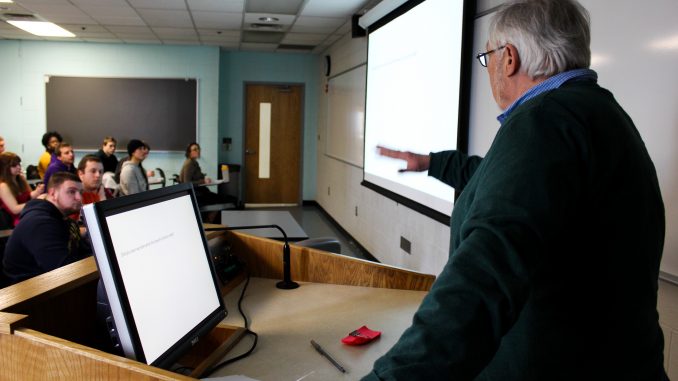
Sixty-eight-year-old Roman Cybriwsky is a nightclub kind of guy.
At least, that’s what he calls himself. It wasn’t until the geography professor was 58 and living in Tokyo, however, that he found himself in these sweaty, shady, late-night hideouts.
As an urban geographer, Cybriwsky studied nightlife in a Tokyo nightclub district called Roppongi. The location is within walking distance of Temple’s Japan campus, where he worked in administration at the time. He eventually published a book on the nightlife of Roppongi.
Cybriwsky said urban geography is his passion. He’s studied topics that pertain to many cities and neighborhoods, like the gentrification of Fairmount and the demise of Roppongi. Now, Cybriwsky is approaching what is likely his biggest project yet, returning his attention to his birthplace: Ukraine.
“By the time I finally finished [in Japan] I had gray hair and I started thinking, ‘Ukraine is evolving. There’s a whole new world over there. Let’s go write a book,’” he said. “From that, I became interested in what I do now.”
Cybriwsky is Ukrainian-American. He was born in a European refugee camp at the end of World War II. When he was 4 years old, his family moved to America after they were unable to return to Ukraine.
“[My parents] provided well enough for us to succeed in the states, but also left us with a sense of identification with the ethnic culture that we came from,” Cybriwsky said.
Cybriwsky said both this sense of identification and the stirring political and social conflicts in Kiev are what pushed him to study the city. He’s writing a book on the city’s social and political transformation. In his teaching at Temple, Cybriwsky said he hopes to inform students and staff of events in Kiev.
“I feel myself to be an educator,” Cybriwsky said. “If I’m in a privileged position to know something, I’m happy to share.”
Cybriwsky recently held a lecture on violence in Ukraine as part of Professor Ralph Young’s Dissent in America teach-ins. About 40 students attended the two-hour lecture, which featured visual aids like maps and photographs, many of which Cybriwsky said he took during his travels. Throughout the lecture, he mentioned that he knows several of Ukraine’s social and political figures.
Several students asked questions about Cybriwsky’s personal experiences in the tumultuous city. Cybriwsky said students and staff frequently approach him with questions about Ukraine.
He said he noticed although students usually have little knowledge of Ukraine, they often say they are frequently confronted with images of Kiev’s riots through the media.
“It’s a subject that’s in the news now,” Cybriwsky said. “But when it wasn’t in the news, which was most of the time, no one is aware. And that’s what Ukrainians say – now, at least the world knows Ukraine.”
Junior Andrew Sandefur said Cybriwsky is his news source for current events in Kiev. The media studies and production major took a Global Cities course with him last semester.
Sandefur said he hadn’t heard of Kiev until Cybriwsky spent a day lecturing on the city during class.
“He definitely went very in depth with it, more than he had the other cities,” Sandefur said. “So I know that it’s a city that’s very dear to him because he’s writing a book about it, and in this class he has mentioned it several times. When the uprisings in Kiev were happening, he told us in class, ‘My mind is somewhere else today, so I apologize if I seem not fully here.’”
Cybriwsky said studying Kiev is sometimes tiring because of his connection to Ukraine, but he tries not to let it impact his teaching.
“I’m just exhausted from what goes on there,” Cybriwsky said. “If it’s not in the description, it wouldn’t be right, and I’m aware of that boundary. Of course, with anything with a political flavor, not everybody is going to agree with how I view the world. And so, to a certain extent, you need to stay away from topics where you have emotional attachment, because you realize not everyone is going to agree with you.”
Sandefur said he has enjoyed listening to Cybriwsky.
“It’s very eye-opening and a lot of times unexpected,” Sandefur said of his lecturing. “We get a deep insight of what he’s seen.”
Cybriwsky has been to many cities because he frequently travels as an urban geographer. He said his passion is becoming acquainted with unfamiliar territories like Roppongi in Tokyo. Until recently, Cybriwsky’s urban studies have primarily focused on Asia, but he said Ukraine has always occupied a space in his mind.
“In this stage of my career, I decided that I wanted to actually go back to this part of the world because I didn’t actually know it,” Cybriwsky said. “I’m perfectly aware that the travails of Ukraine are not necessarily the worst in the world. In fact, there are many places we know where the bloodbath is greater and the suffering longer. And it sometimes makes me feel guilty to say, ‘Well, I’m studying this and not that.’”
He said as a professor, he feels it’s his obligation to leave students with a better understanding of the world and be as accurate as possible in the subject matter of his specialization.
“You can’t be everywhere, you have to pick and choose – and it is natural to be drawn to a topic that is presented in front of you,” Cybriwsky said. “I’ve been taught to be aware of this topic. It is a part of my life.”
Claire Sasko can be reached at claire.sasko@temple.edu or on Twitter @ClaireSasko.


Be the first to comment